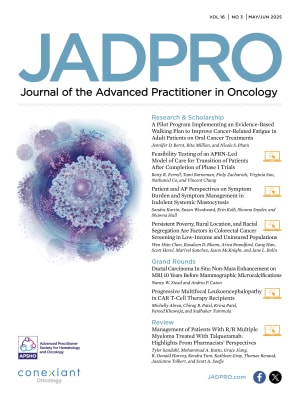Abstract
In recent years, the role of molecular testing in non–small cell lung cancer (NSCLC) has rapidly grown. The US Food and Drug Administration (FDA) has approved several new medications to treat patients with genetic alterations over the past 10 years, and the development of improved technology has made sequencing more affordable, efficient, and convenient. With these advances, the popularity of genomic sequencing will continue to rise rapidly, further affecting routine clinical practice and treatment recommendations. Therefore, it is increasingly important for advanced practitioners treating patients with NSCLC to understand how these genomic markers are used in practice, comprehend the updated treatment guidelines to be able to identify which patients to test with which type of test and at what point in their treatment, and have a firm grasp of where the world of molecular testing is headed.





